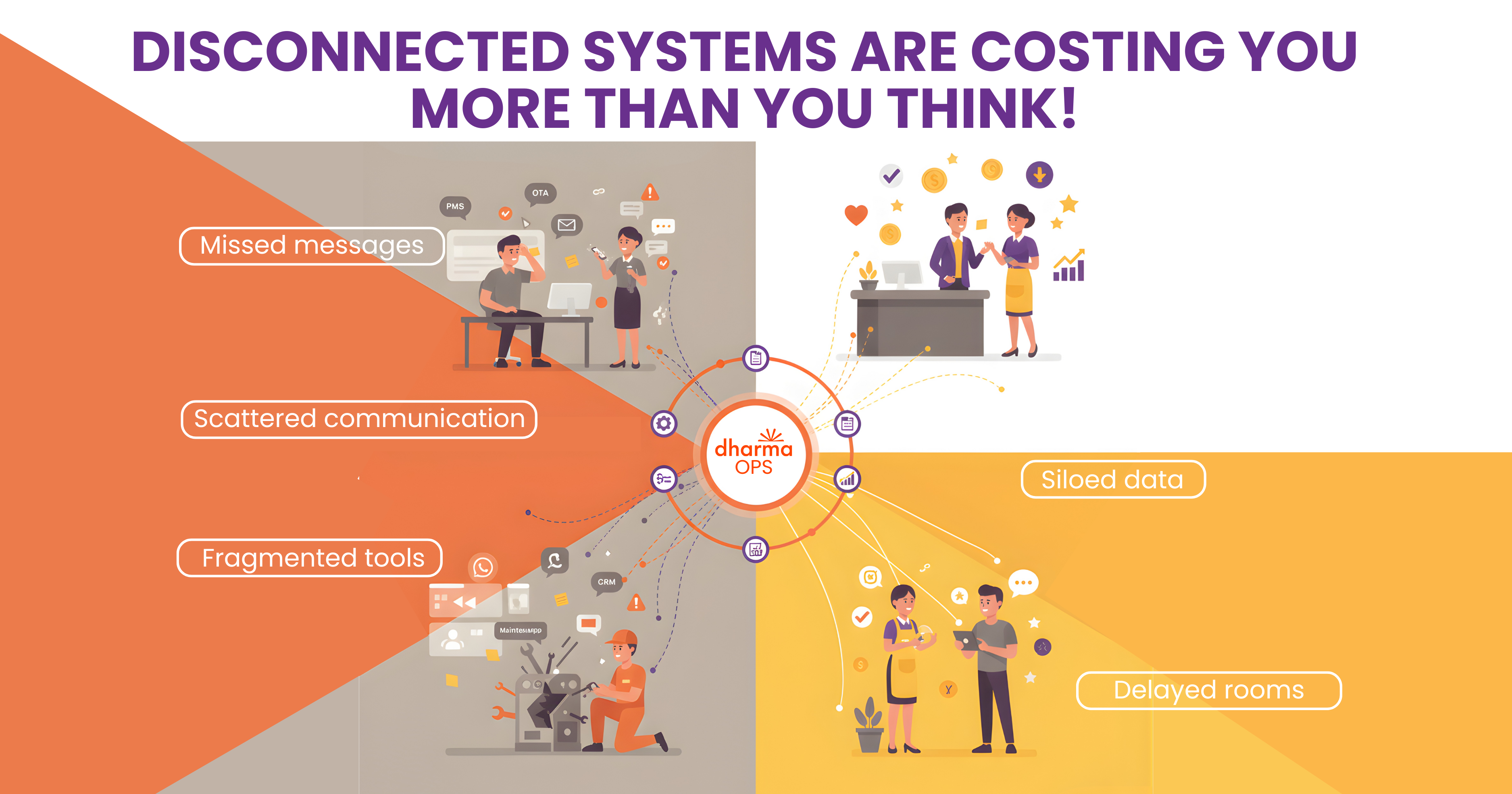Rising operational expenses are a reality hotels can no longer ignore. From utilities and maintenance to staffing and guest services, costs are growing faster than revenue recovery in many markets. According to CBRE, both labor expenses and operating supply costs rose in 2025 - by 4.5% and 9.4%, respectively. This has led hotel owners and finance teams to focus sharply on hotel operating costs reduction strategies that go beyond incremental savings and instead drive systemic efficiency.
Today, the most impactful lever in achieving that goal is integrated technology - platforms that connect housekeeping, maintenance, guest communication, and automation into one cohesive ecosystem.
Traditional cost control methods - such as switching to LED lighting or renegotiating vendor contracts - address only the surface-level challenges. The hospitality sector’s 24/7 operations leave it particularly vulnerable to inefficiencies arising from poor coordination, equipment downtime, and reactive maintenance. According to Deloitte’s 2024 Travel & Hospitality Outlook, technology-driven optimization can reduce controllable operating costs by up to 18% when applied cohesively across departments. Building on this, Deloitte’s 2025 Travel Industry Outlook highlights that AI is increasingly being leveraged for operations optimization, predictive maintenance, and personalized guest communications. Together, these insights emphasize that integrated technology solutions are no longer optional - they are essential for achieving meaningful hotel operating costs reduction and delivering consistent, high-quality service.
In this landscape, cost savings in hospitality are no longer about cutting corners; they’re about creating operational synergy. Hotels that integrate their technology systems - from room automation to housekeeping scheduling - experience measurable benefits such as:
This marks the shift from fragmented tech tools to integrated tech for hotels that unifies every operational layer.
Ready to unify your hotel operations and cut costs? See how Dharma OPS connects housekeeping, maintenance, and guest services into a single platform.
To effectively reduce hotel operating costs, decision-makers must start with visibility — understanding which areas consume the most resources and why. According to the U.S. Environmental Protection Agency (EPA), hotels spend approximately 6% of their operating costs on energy each year. Additionally, the American Hotel & Lodging Association (AHLA) projects that hotels will pay a record $128.47 billion in wages, salaries, and other compensation in 2025, reflecting a 2.1% increase from the previous year. These figures underscore the critical need for integrated technology solutions to reduce controllable operating costs and enhance overall operational efficiency.
Major cost centers typically include:
When these systems function in isolation, inefficiencies compound. For instance, a delayed maintenance update can result in longer room turnaround times, affecting housekeeping schedules and guest readiness - a ripple effect that silently erodes margins.
An integrated operations platform, such as Dharma OPS bridges these gaps, allowing cross-functional data to drive smarter decisions and faster responses.
Automation is no longer a luxury feature; it’s a profitability tool. Smart automation enables hotels to anticipate needs rather than react to them - optimizing resource allocation, labor, and maintenance with precision.
Key examples of hotel automation in practice include:
McKinsey's research indicates that automation-powered, cross-functional agentic systems can deliver significant cost reductions and efficiency gains across industries. For example, early pilots using these technologies have demonstrated up to 70–80% reductions in cost per transaction for certain labor-intensive processes. However, the true potential of operational efficiency depends not on the number of tools a property uses, but on how seamlessly automation integrates across all touchpoints.
This is where platforms like Dharma create tangible value - by unifying automation, communication, and task management into a single, cohesive system that enhances efficiency and reduces operational complexity.

Maintenance has traditionally been treated as a reactive function - fix it when it breaks. However, this approach is increasingly recognized as inefficient and costly. In fact, reactive maintenance can cost 25–30% more than preventive maintenance due to factors like emergency labor, expedited parts, and unplanned downtime. This makes hotel maintenance software a critical asset in modern hotel management.
An integrated maintenance system provides:
For example, when the housekeeping module logs a broken fixture, the system automatically generates a maintenance work order, assigns the right technician, and notifies the front desk — all in real time. No calls, no missed communication. This approach not only saves time but directly translates to cost savings in hospitality by preventing escalations and downtime.
Turn automation into measurable savings. Discover how Dharma OPS helps hotels optimize labor, maintenance, and guest services - without adding complexity.

Most hotels today already use some form of tech - a PMS, a booking engine, a messaging app, or a maintenance tracker. However, when these tools don’t communicate, they create data silos that result in duplication, delays, and missed opportunities.
In 2025, a report by Revinate and Hapi revealed that nearly 40% of hoteliers cite disconnected systems as their biggest obstacle, with 49% struggling to access critical data needed for revenue and operational decisions. The reason is simple - legacy systems weren’t designed to talk to each other.:
An integrated tech approach for hotels solves this by:
This end-to-end integration builds a foundation for continuous improvement and long-term profitability.
Stop letting disconnected systems drain your revenue. Explore Dharma OPS and see how integrated hotel technology transforms efficiency and guest satisfaction.
This is where Dharma’s Hotel Operations Platform (OPS) makes a measurable difference. Instead of juggling multiple tools, Dharma unites every key operational pillar - reservations, housekeeping, guest messaging, and maintenance - into one data-driven ecosystem.
Key Modules Driving Efficiency and Cost Reduction
Customers using Dharma report up to 25% reduction in operational overheads, faster turnaround times, and improved guest satisfaction - all key components of hotel operating costs reduction.
The next phase of cost efficiency in hospitality is being shaped not by technology alone, but by evolving guest expectations - for instant communication, personalized service, and frictionless experiences across every touchpoint.
Today’s travelers expect real-time responses, self-service options, and consistency whether they interact via WhatsApp, mobile apps, or front desk. Meeting these expectations requires technology that connects every system and every department behind the scenes.
That’s where integrated hotel technology becomes critical - enabling hotels to deliver guest-centric experiences while optimizing internal efficiency.
Dharma’s platform is built for this new reality - scalable, interoperable, and designed to evolve with guest behavior. From boutique properties to multi-hotel groups, Dharma empowers teams to meet modern guest demands while ensuring cost savings that are sustainable, measurable, and experience-driven.
Reducing costs doesn’t have to mean reducing quality. The right blend of automation, integration, and insight can empower hotels to operate leaner while elevating the guest experience.
Platforms like Dharma are leading this transformation by helping hotel owners and finance teams not just reduce hotel operating costs, but reimagine what operational excellence looks like. Through hotel maintenance software, AI-driven task management, and unified communication tools, Dharma ensures that efficiency becomes a competitive advantage, not just a financial necessity.
In an era where every dollar saved can be reinvested into better guest experiences, integrated technology isn’t just a support function - it’s the backbone of modern hospitality success.